PRINCETON, NJ -- An overwhelming 79% majority of Americans believe the president should get the approval of Congress before sending U.S. armed forces into action outside the United States, and 70% believe congressional approval should be required before the president decides to bomb suspected terrorists.
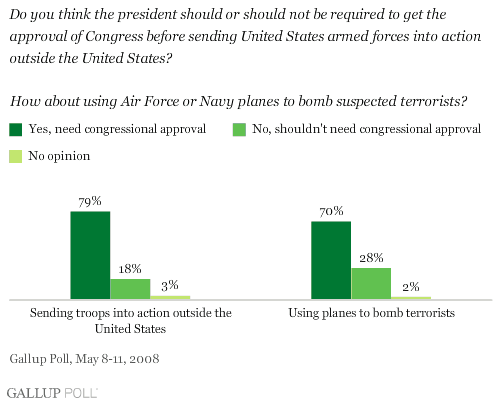
According to Gallup trends, there has been little change over the last 35 years in the basic sentiment that the president needs congressional approval before sending U.S. troops into combat overseas.
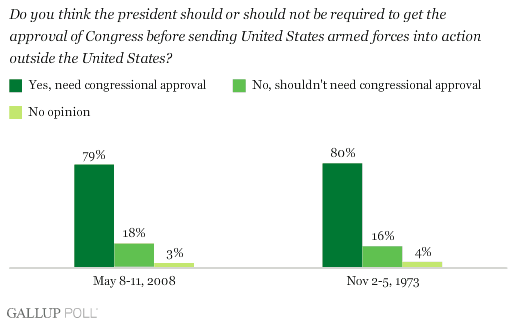
The year 1973 was significant in the history of debate over presidential war powers. That year, U.S. involvement in the Vietnam War was drawing to a close and Congress acted in an attempt to bring clarity to the war powers issue -- enacting over President Nixon's veto the War Powers Act of 1973, which said, in part: "The President, in every possible instance, shall consult with Congress before introducing United States Armed Forces into hostilities or into situations where imminent involvement in hostilities is clearly indicated by the circumstances, and after every such introduction shall consult regularly with the Congress until United States Armed Forces are no longer engaged in hostilities or have been removed from such situations."
At that time, Congress was clearly reflecting the will of the people. Eighty percent of Americans in a November 1973 Gallup Poll agreed that Congress needed to give its stamp of approval before the president committed U.S. troops into action on foreign soil.
Now, some 35 years later, as the United States is involved in another drawn-out war, the percentage of Americans agreeing with this sentiment is almost exactly the same, at 79%.
What the U.S. Constitution's framers intended in terms of the war powers of the governmental branches and how exactly the nation should react in today's changed and fast-moving international environment continue to be a matter of dispute. This complexity led to the formation of a National War Powers Commission in 2007, created to review relevant legal and historical issues and, ultimately, to make a recommendation on how the executive and legislative branches should approach war situations. (The commission, headed by two former secretaries of state, James Baker and Warren Christopher, is set to make its final report Tuesday.)
The recent Gallup Poll shows that while there is some difference of opinion by partisanship on the idea that the president be required to get congressional approval, a majority of every political group agrees.
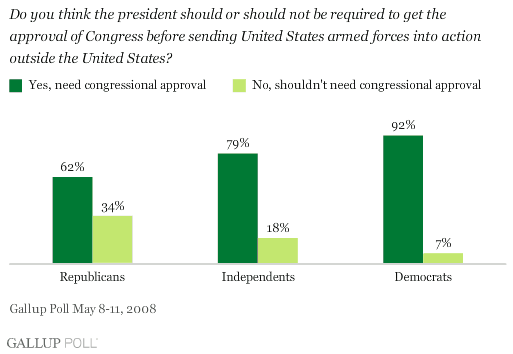
Specific Situations
The current poll asked Americans about the necessity for the president to gain the approval of Congress before sending U.S. armed forces into action in five specific situations.
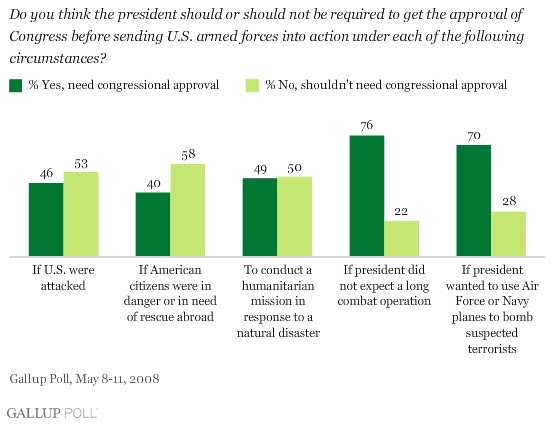
There is significant variation across these hypothetical situations. Half or more of Americans do not believe the president needs to get congressional approval before committing U.S. forces into action if the United States is attacked, if American citizens are in danger or in need of rescue abroad, or in order to conduct a humanitarian mission in response to a natural disaster.
On the other hand, there is widespread public agreement that the president needs congressional approval to send troops into action even if he or she does not think a combat operation would last a long time, and in a situation in which the president wants to use Air Force or Navy planes to bomb suspected terrorists.
Democrats are significantly more likely than Republicans to agree that the president needs
congressional approval before bombing suspected terrorists. Still -- as is the case for the basic war powers question -- even a slight majority of Republicans agree that congressional approval is needed in this scenario.
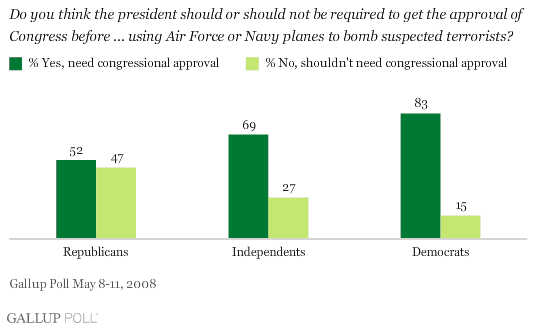
Survey Methods
Results are based on telephone interviews with 1,017 national adults, aged 18 and older, conducted May 8-11, 2008. For results based on the total sample of national adults, one can say with 95% confidence that the maximum margin of sampling error is ±3 percentage points.
Interviews are conducted with respondents on land-line telephones (for respondents with a land-line telephone) and cellular phones (for respondents who are cell-phone only).
In addition to sampling error, question wording and practical difficulties in conducting surveys can introduce error or bias into the findings of public opinion polls.
To provide feedback or suggestions about how to improve Gallup.com, please e-mail feedback@gallup.com.
